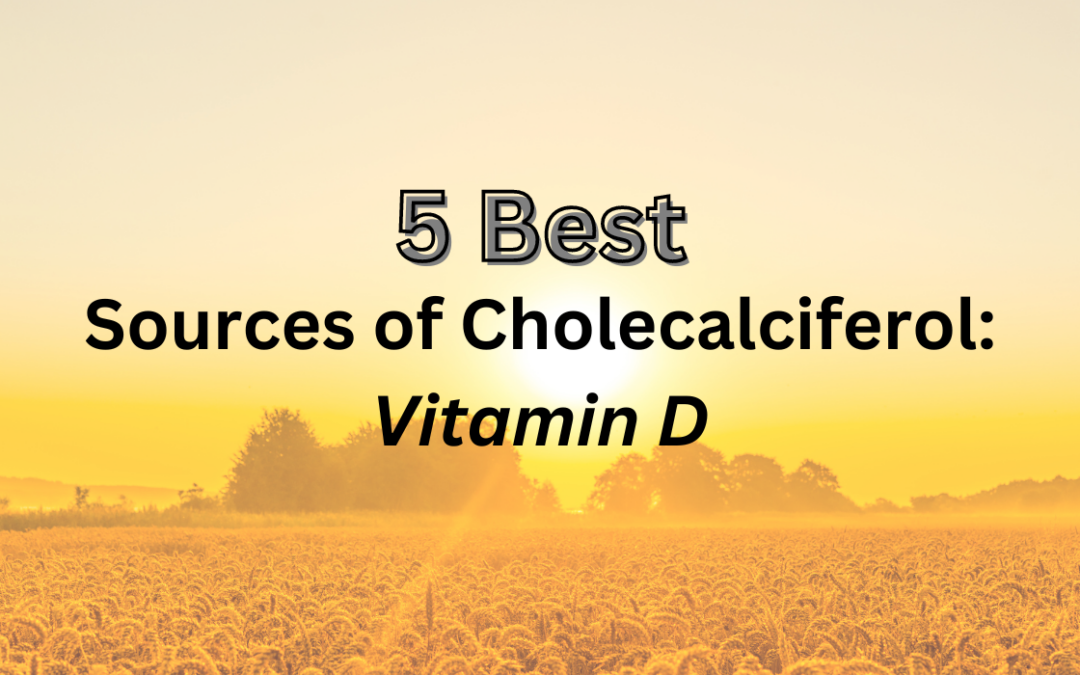Cholecalciferol, commonly known as vitamin D, is a crucial nutrient that plays a significant role in maintaining our overall health. Often referred to as the ‘sunshine vitamin’, cholecalciferol is unique in its formation and function, making it a standout in the world of health and wellness.
This article delves into the essence of cholecalciferol, its importance, and the top five sources to enhance your vitamin D intake.
What is Cholecalciferol?
Cholecalciferol, or vitamin D, is a fat-soluble vitamin that is absorbed alongside fats in our diet and can be stored in the body’s fatty tissues. A remarkable feature of cholecalciferol is its synthesis in the body under the influence of sunlight, particularly UVB rays, earning it the nickname “sunshine vitamin.”
Apart from sun exposure, cholecalciferol can also be derived from certain dietary sources, which we will explore further. The majority of people are vitamin D deficient, so it may be important for you to take vitamin D supplements to make up for this.

Why You Need Cholecalciferol
Cholecalciferol is vital for various bodily functions, and its deficiency can lead to several health issues. Here are some key roles it plays:
- Bone Health: It is essential for calcium absorption in the gut, crucial for strong and healthy bones, and helps prevent conditions like rickets, osteoporosis, and osteomalacia.
- Muscle Function: Cholecalciferol is important for muscle movement, and its deficiency can cause muscle weakness.
- Nervous System: It aids in the transmission of messages between the brain and body parts.
- Immune System: Cholecalciferol enhances the pathogen-fighting abilities of certain white blood cells, playing a role in immune defense and inflammation regulation.
- Other Roles: Emerging research indicates its potential benefits in heart health and mood regulation.
5 Ways to Increase Vitamin D
Boosting your cholecalciferol (Vitamin D) intake is essential for maintaining good health. Here’s a closer look at five excellent sources:
Salmon
This fish is a powerhouse when it comes to vitamin D content. A single serving of salmon can provide a substantial portion of your daily vitamin D needs. Wild-caught salmon is particularly rich in cholecalciferol, with just a 3.5-ounce serving offering more than the daily recommended intake for most individuals. Including salmon in your diet not only boosts your vitamin D levels but also provides omega-3 fatty acids, which are beneficial for heart health.
Egg Yolks
Eggs, particularly the yolks, are a convenient and versatile source of vitamin D. They can be particularly beneficial for those who don’t consume fish or dairy. The vitamin D content in egg yolks depends on the sun exposure of the chickens and whether they have been fed vitamin D-enriched feed. Free-range or pastured eggs typically have higher vitamin D levels. Incorporating egg yolks into your diet through various recipes can significantly contribute to your daily vitamin D intake.
Mushrooms
As the only plant-based source of vitamin D, mushrooms hold a unique place in a vitamin D-rich diet. When exposed to sunlight, mushrooms produce vitamin D, much like humans. The amount of vitamin D in mushrooms varies depending on the type and exposure to ultraviolet light. Some commercially grown mushrooms are treated with UV light to increase their vitamin D content. Including mushrooms in your diet can be a great way for vegetarians and vegans to increase their cholecalciferol intake.
Fortified Foods
Many foods are fortified with vitamin D to help people meet their daily requirements. This is particularly important for foods that naturally contain little or no vitamin D. Common fortified foods include dairy products like milk, plant-based milk alternatives, orange juice, and cereals. Reading labels is key to understanding how much vitamin D you’re getting from these fortified products.
Tuna and Mackerel
These fish are not only delicious but also excellent sources of vitamin D. Canned tuna and mackerel are convenient and cost-effective options that provide a good amount of cholecalciferol. They are versatile ingredients that can be added to salads, sandwiches, and a variety of dishes, making it easy to incorporate them into your daily diet.
Why Vitamin D Supplements Are Needed
For those who cannot get sufficient cholecalciferol from sunlight and food, supplements are a practical solution. With a significant portion of the population deficient in vitamin D, supplements, available in pills or liquids, ensure adequate intake, especially in regions with limited sunlight.
In summary, cholecalciferol or vitamin D is indispensable for our health, obtainable from sunlight, foods like salmon, egg yolks, mushrooms, and supplements. Balancing these sources is key to maintaining adequate levels of this essential nutrient. So, whether you’re soaking up some sun or enjoying a meal rich in vitamin D, remember the incredible benefits of cholecalciferol for your health!
Related Article: The 5 Best Vitamin D Foods
Affiliate Information
Cancer Guide Foundation is an affiliate for some or all of the products on this page. When you click the link and purchase on Amazon, you support the mission of helping cancer patients find answers and hope.
Thank you for your support!
Medical Disclaimer
Cancer Guide maintains this website for information, education, and communication purposes. Nothing on this website should be construed as a promotion or solicitation for any products, or for the use of any product in a particular way that is not authorized by the laws and regulations of the country where the user is located.

Recent Comments